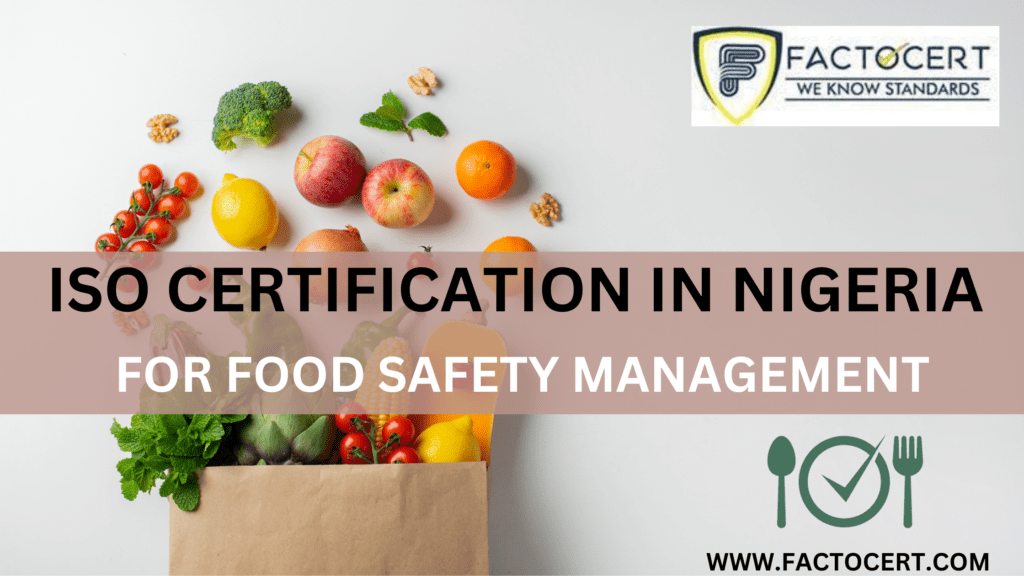ISO Certification in Nigeria for several reasons, ISO-certified commodities are considered more secure in Nigeria and globally. ISO (International Organization for Standardization) certification assures consumers, regulatory bodies, and businesses that specific food products meet stringent quality and safety standards. In Nigeria, ISO certification is notably beneficial for food safety management, and ISO 22000 is the critical certification that facilitates this regard.
Here’s why ISO-certified commodities are more secure in Nigeria and how ISO 22000 Certification in Nigeria plays a pivotal role:
- Adherence to International Standards: ISO standards, including ISO 22000, are internationally recognized and respected. When a food product is ISO-certified, it complies with globally acknowledged food safety and quality standards. This assurance is valuable to consumers and local and international trade partners.
- Stringent Quality Control: ISO Certification in Nigeria involves strict quality control measures. Food products bearing the ISO mark have undergone rigorous testing, inspection, and monitoring throughout the production and supply chain, ensuring they meet high-quality and safety standards.
- Focus on Food Safety Management: ISO 22000 is designed for food safety management systems. It provides a structured framework for organizations in Nigeria to identify, manage, and mitigate food safety hazards effectively, thereby reducing the risk of contamination and contaminated illnesses.
- Risk-Based Approach: ISO 22000 promotes a risk-based approach to food safety. Nigeria’s organizations must assess potential risks to food safety, implement controls, and continuously monitor and enhance their processes to minimize these risks.
- Traceability: ISO-certified goods often come with robust traceability systems. This means that the origin of ingredients and the production process can be readily traced, enabling swift recalls and investigations of safety concerns or contamination incidents.
- Process Optimization: Implementing ISO 22000 involves analyzing and optimizing food production processes, which can lead to cost savings, increased efficiency, and reduced waste. It ensures that resources are used effectively.
- Training and Awareness: ISO 22000 requires organizations to provide training and raise employee awareness regarding food safety. This ensures that everyone in the organization is aware of their role.
- Compliance with Regulations: ISO 22000 Certification in Nigeria aligns with regulatory requirements in Nigeria and other countries. As a result, goods having the ISO certification are more likely to adhere to national and international laws and regulations governing food safety.
- Consumer Confidence: ISO certification in Nigeria instills confidence in consumers. They are likelier to trust and choose products with the ISO certification mark because it signifies a commitment to food safety and quality.
- Market Access: Many retailers and export markets require ISO certification in Nigeria as a prerequisite for doing business. Obtaining ISO 22000 certification can open up new markets and export opportunities for food businesses in Nigeria.
- Continuous Improvement: ISO standards emphasize continuous improvement. ISO-certified companies regularly assess and enhance their processes to increase food safety and quality standards.
Why you should Choose Factocert for ISO Certification in Nigeria?
Factocert is the preeminent ISO consuv ltant in Nigeria, offering top-notch expertise in ISO certification services. Their commitment to excellence and client contentment makes them the preferred choice for businesses seeking ISO certification in Nigeria.
Factocert is one of the top prominent ISO Certification providers in Nigeria. We provide the finest ISO Consultant service in Lagos, Abuja, Kano, Ibadan, Benin City, Port Harcourt, and other main cities in Nigeria with the assistance of implementation, training, auditing, and registration. We provide various ISO Standards like ISO 27001, ISO 9001, ISO 14001, ISO 13485, ISO 22000, ISO 17025, ISO 45001, and many others.
Conclusion:
ISO-certified commodities are more secure in Nigeria due to the comprehensive and internationally recognized standards and processes that ISO certification entails. ISO 22000, in particular, plays a vital role in facilitating food safety management in Nigeria by providing a structured framework for identifying and mitigating food safety risks, ensuring regulatory compliance, and establishing consumer trust.
ISO certification in Nigeria signifies adherence to international standards in various sectors, such as quality management, environmental practices, and information security. It increases competitiveness, enhances product/service quality, and ensures regulatory compliance. Businesses, government agencies, and organizations pursue ISO certification to demonstrate commitment to excellence, improve credibility, and facilitate global trade.
For more information visit: ISO Certification in Nigeria





